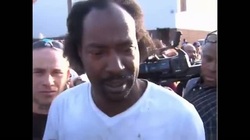 Charles Ramsay - Good Neighbor
Charles Ramsay - Good Neighbor Internet. Smartphone. Texting.
What do those things have in common? Well, the first two are starting to fade. The last three are contributing to the fade.
Community used to have a different feeling when I was growing up. It could mean the people who lived next door (I knew them all when I was growing up on Herkimer Street in Waterbury, Conn. - the Claffeys next door, the Palombas across the street) .Today, I live in Washington, D.C. I know the neighbor we share a wall with. But I have no idea who lives two doors down.
In Cleveland, fortunately, Charles Ramsay didn’t run the other way when he heard a scream for help. He felt a sense of community. Of neighborhood. Someone who lived next door – a young woman he never knew even existed next door – screamed for help and he crashed in the door to get her out. And a 10-year mystery that everyone thought had ended in tragedy now was ending in a sense of community.
I use the Internet as much as the next guy. I text (though mostly because a few people I know feel that’s the most convenient way to communicate. It’s not my first instinct). But the generations after mine are being raised with Smartphones. With texting. With video games where you kill people and feel no emotion at all. With chat rooms where, sometimes, you even take on a different persona to make a connection. Dishonest as that connection may be.
No single invention is responsible, of course. But these different ways of communicating, while bringing more efficiency in many ways, also separate us rather than unite us. I work in an office as modern as any other – we all have computers, phones, smartphones. I walk in the office a lot (I once got the “hall monitor” award because I walk so often). I almost never call someone who is in the office. I walk to his or her office. I like the face-to-face for a variety of reasons. I like the connection. But that’s not the norm. Some apparently would rather leave a voice message or send an email and wait hours to hear back from someone who may sit 50 feet away. Not so efficient in my mind.
All these little breaks from personal connection, I think, contribute to the dividing, not uniting, of us as individuals, and maybe even of our leaders in many ways.
Heroes are few and far between. Charles Ramsay is not a hero. He is, though, a good neighbor. Something that is becoming even rarer.

 RSS Feed
RSS Feed